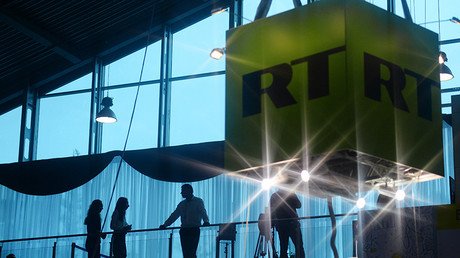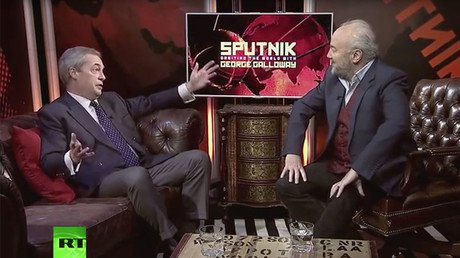‘Ridiculous & insane hysteria’: Russia placed alongside ISIS in new EU resolution debated by MEPs
The EU Parliament is debating a resolution that aims to establish measures “to tackle Russian and ISIS propaganda.” In the latest wake of anti-Russia sentiment, the British parliament will also hear a report denouncing public figures with alleged Russia links.
On Wednesday, MEPs in Strasbourg will vote on a non-legislative resolution which calls for the EU to “respond to information warfare by Russia and Islamist terrorists with more positive messaging, awareness raising, and education in information literacy.”
READ MORE: Why has NATO chosen Russia as its enemy instead of ISIS?
Ahead of the vote, the issue was debated at a plenary sitting, with a report "calling for stronger counter measures" having been presented the lawmakers, according to the European Parliament. The report, written by a Polish member of the European Conservatives and Reformists (ECR) group, Anna Fotyga, said that Russia aims to "incite fear and divide Europe" along with terrorist organizations, such as Islamic State (IS, formerly ISIS/ISIL).
"The EU is under growing pressure from disinformation by countries, such as Russia, and non-state actors, like ISIS/Daesh, Al-Qaeda and other violent jihadi terrorist groups which promote violence and use pseudo-news agencies and internet trolls to challenge democratic values and divide Europe,” the newsletter said.
RT was cited as one of the alleged propaganda "tools". It said that Moscow has an influence on media markets and societies in the EU and other countries. Fotyga told the European Parliament, “surely the citizens of the United States of America are also the target of Russian propaganda with the use of many tools such as Russia Today [RT].”
“It comes to being ridiculous when the same report includes a threat coming from ISIL and from Russia, it demonstrates that people have lost their mind and sense of reality,” French MEP Jean-Luc Schaffhaueser told RT, adding that the situation is now at a point where he doesn't know "whether to cry or to laugh".
The EU "desperately needs an enemy, be it Russia or any other," that it can blame for any of its own failures, the MEP said. "No one [in the parliament] wants to admit that EU ideology has led to the current situation, the bloc's economic, social and political fiasco," Schaffhaueser added.
“We are lucky that there is Russian media and other media that stand against [the EU's] official propaganda. In Europe, its institutions and parliament, they refuse to see the obvious, to see the truth. And I am saying that we are lucky because it's European democracy that is at stake," he said.
During the debate, Spanish MEP Javier Couso Permuy denounced the report as an “insult to the intelligence of Europeans.”
“This report is insane. It fosters hysteria against Russia and neo-McCarthyism in Europe. It's a caricature of Russia,” Permuy said. “This is a dangerous report. It's headed at confrontation and it's an assault on freedom of information. To put terrorist groups like Daesh, which disseminates live videos of torture and murders, on the same footing as a member state of the Security Council and other multilateral organisations which we have a grievance with, is an insult to the intelligence of Europeans.”
In the meantime British right-wing UKIP party MEP James Carver noted the report is “worryingly reminiscent of the Cold War.”
“Diplomacy and deterrence are delicate mechanisms,” Carver said. “Escalation can spiral out of control and lead us to places that I trust nobody in this chamber wishes to go. You have to stop your neo-colonialism and your justification for more European Union and remember the hard learned lessons of the Cold War.”
Meanwhile, as MEPs debated how to counter the alleged Russian threat and deal with the "impact of this disinformation," their British colleagues will be presented with another report involving Russia.
Called 'Putin’s Useful Idiots,' the document was written by Andrew Foxall, the Director of the Russia Studies Centre at the conservative think tank, the Henry Jackson Society.
"Challenging [the] credibility" of politicians and other prominent figures who are sympathetic to Russia, it proposes a radical clampdown on such people, suggesting they have been paid by the Kremlin.
The report mentions a number of people who have shared their opinions on a range of international issues with RT viewers over the years, including UKIP leader Nigel Farage.
READ MORE: ‘New form of segregation?’: Moscow reacts to US State Dept treatment of RT reporter
"Many of those... have appeared on RT. If they received appearance fees, then they have also taken money from the Kremlin, thereby establishing financial links between themselves, their organizations and Moscow,” Foxall stated, adding that with the Kremlin's "heavy investment" the Russian media aims to influence European public opinion.














